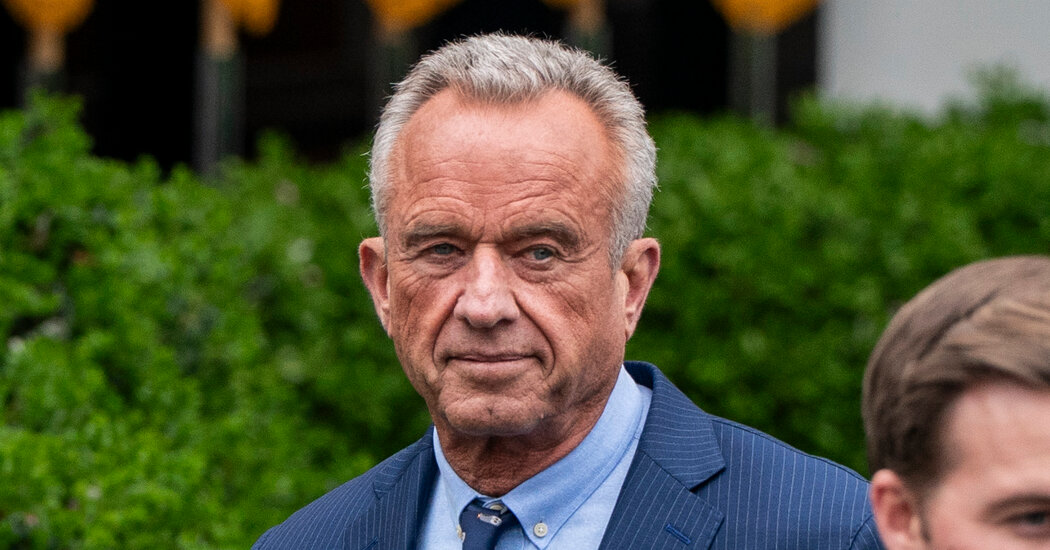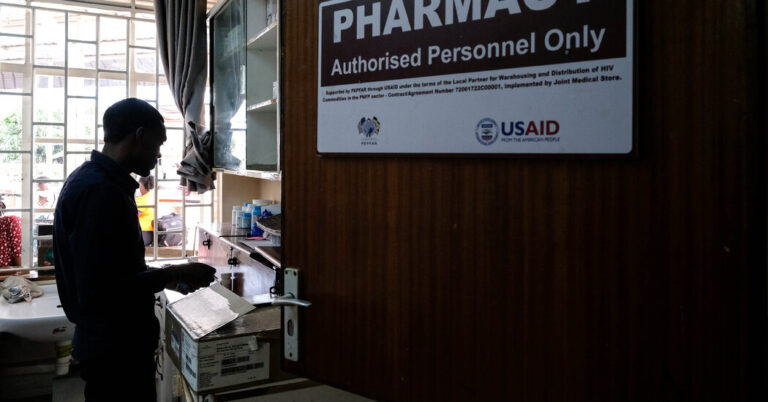Here is the text-only version of the article:
Robert F. Kennedy Jr. has spoken of an “existential threat” that he said can destroy the nation. “We have the highest chronic disease burden of any country in the world,” Mr. Kennedy said at a hearing in January before the Senate confirmed him as the secretary of Health and Human Services. And on Monday he is starting a tour in the Southwest to promote a program to combat chronic illness, emphasizing nutrition and lifestyle. But since Mr. Kennedy assumed his post, key grants and contracts that directly address these diseases, including obesity, diabetes and dementia, which experts agree are among the nation’s leading health problems, are being eliminated.
“These programs range in scale and expense. Researchers warn that their demise could mean lost opportunities to address an aspect of public health that Mr. Kennedy has said is his priority.”
“This is a huge mistake,” said Dr. Ezekiel Emanuel, the co-director of the Healthcare Transformation Institute at the University of Pennsylvania’s Perelman School of Medicine.
Decades of Diabetes Research Discontinued
Ever since its start in 1996, the Diabetes Prevention Program has helped doctors understand this deadly chronic disease. The condition is the nation’s most expensive, affecting 38 million Americans and incurring $306 billion in one recent year in direct costs. With about 400,000 deaths in 2021, it was the eighth leading cause of death.
The program has been terminated, and the reason has little to do with its merits. Instead, it seems to be a matter of a lead researcher’s working in the wrong place at the wrong time.
The results were a huge victory. Those assigned to follow a healthy diet and exercise routine regularly reduced their chances of developing diabetes by 58 percent. Those who took metformin, a drug that lowers blood sugar, decreased their risk by 31 percent.
…
(The rest of the text is below)
The study investigators are appealing to the diabetes caucus in Congress, hoping it can help make their case to the Health and Human Services. “We hope the congressmen and senators might prevail and say: ‘This is crazy. This is chronic disease. This is what you wanted to study,'” Dr. Nathan said. So far, there has been no change.
Compared with the Diabetes Prevention Program, a program to train pediatricians to become scientists is tiny. But pediatric researchers say that the Pediatric Scientist Development Program helps ensure that chronic childhood diseases are included in medical research.
It began 40 years ago when chairs of pediatric departments called for the creation of the program, which has been continually funded ever since by the National Institute of Child Health and Human Development.
…
The reason? Diversity. The termination letter, from officials in the National Institute of Child Health and Human Development, said there was no point in trying to rewrite the grant request. The inclusion of diversity made the application so out of line that “no modification of the project could align the project with agency priorities.”
Mr. Nixon, the health department spokesman, did not reply to queries about the pediatric program’s cancellation.
Participants in the program are distraught.
Dr. Sean Michael Cullen had been studying childhood obesity at Weill Cornell in New York. He has investigated why male mice fed a high-fat diet produced offspring that became fat, even when those offspring were fed a standard diet.
…
Now the funds are gone. He may seek private or philanthropic funding, but he doesn’t have any clear prospects.
Dr. Evan Rajadhyaksha is in a similar situation. He’s a childhood kidney disease specialist at Indiana University. When he was a resident, he cared for a little girl who developed kidney disease because of a condition in which some urine washes up from the bladder into the kidneys.
…
Now, that work has to stop. Without funding, he expects to leave research and return to clinical work.
Dr. Permar said she hadn’t given up. The program costs only $1.5 million each year, so she and her colleagues are looking for other support. “We are asking foundations,” she said. “We are starting to ask industry — we haven’t had industry funding before. We are asking department chairs and children’s hospitals, are they willing to fund-raise?” “We are literally looking under every couch cushion,” Dr. Permar said. “But,” she said, federal support for the program “has been the foundation and cannot be supplanted.”
Source link




